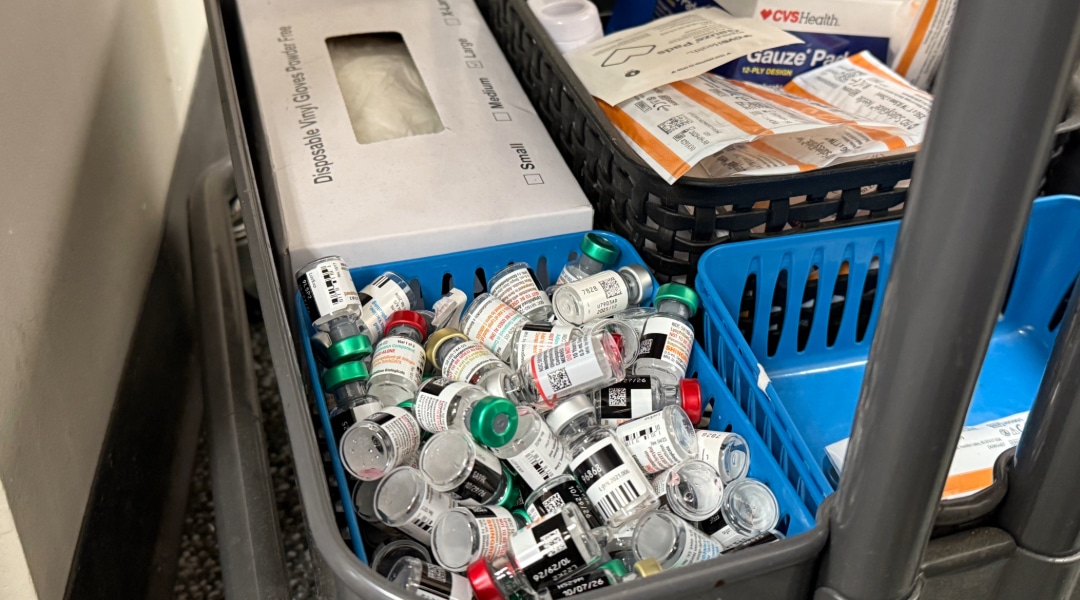Bottles at CVS used to administer the flu vaccine (Photos by Morgan Dunn/Carolina News and Reporter)
It is flu season and Sonny Quintanilla, a graduate student at the University of South Carolina, doesn’t get the flu shot regularly.
“There’s supposed to be a time of year that you’re supposed to take it?” Quintanilla said.
Quintanilla isn’t against the vaccine. In fact, he has gotten it a few times, including this season with his men’s soccer team. He just doesn’t think to get it when it is not suggested to him.
Influenza has spread rapidly across South Carolina this season because fewer people get vaccinated despite the vaccine’s availability. Doctors are urging students especially, because of their close proximity to each other, to get vaccinated more regularly to slow the spread of the virus.
A recent flu watch from the South Carolina Department of Public Health reported increased diagnoses and hospitalizations in every region, reporting “widespread activity” across the state. Despite this update, many college students are among those who did not vaccinate this season.
“Every year across the United States, about 35,000 people die from the flu, and so we need to take the flu seriously, and we have a really good, effective way to reduce our risk,” said Dr. Martha Buchanan, director of Public Health’s Bureau of Communicable Disease Prevention and Control.
So why aren’t people getting vaccinated yearly if the flu is so common? The flu shot historically has had one of the lowest vaccine rates, with only 30% of the population getting it, said Dr. Melissa Nolan, an epidemiologist at the University of South Carolina.
The misconceptions among college students surrounding immunizations may be driving them away from getting their vaccinations. Some students misunderstand how the vaccine works, believing they don’t need to take it if they have never had the flu before, according to Nikhil Kulkarni, a senior who is president of USC’s Association of Public Health Infectious Disease Students.
“You are jeopardizing someone else’s health by coming into close contact with them, and just because you are a healthy individual who can handle that disease doesn’t mean that everybody else is,” Kulkarni said. “There are lots of immunocompromised individuals.”
Many students also might not have faith in its effectiveness.
“I do know of some students who don’t want to get immunized just because of a lack of trust in terms of the healthcare system and I guess what’s being put into their bodies,” Kulkarni said.
Dr. Martha Buchanan has heard this misconception.
“The flu vaccine cannot give you the flu,” Buchanan said. “It might make you feel not great for a couple of days because your immune system kicks in, you get a little bit of a fever and get some swelling where you get the vaccine. But that’s not the flu.”
Many students may also not get it due to a lack of motivation from their parents. Local CVS pharmacist Lindsey Sapp explained that many students come in because their parents tell them to.
“We have a lot of students that come, but whenever they come in, they’re like, ‘Yeah, my mom made me,’ or ‘My mom is asking me to do it, and so I just came to do it,’” Sapp said.
That’s the case for Annie Kosher, a USC sophomore, who said her dad always took her to get the flu shot growing up. Now that she’s away from home and he’s no longer doing that, she forgets to make the appointment.
Seventy percent of people need to be vaccinated for the flu to effectively stop transmission, Nolan said. That’s referred to as “herd immunity.” Kulkarni said when people get vaccinated in large quantities, or a “herd,” it makes the vaccine more effective for the entire population.
“The whole point of public health is that we live with a whole bunch of other people in our environment,” Kulkarni said. “The point of getting vaccinations and getting herd immunity … is to make sure that other individuals, not just ourselves, are not affected by it.”
Flu rates always rise during the fall and winter. The baseline for the flu spread is 3.5%, Buchanan said. That percentage is typically expected to rise during the flu season. So far this season, it has risen to 7.5%, which is typical and the reason why shots are recommended during flu season.
“It’s really important, people who are in close quarters, people are sharing space, need to make sure they’re getting vaccinated,” Buchanan said.
Many students may not even be aware of the risks they are causing, Nolan said.
“College students also don’t tend to think about all the people they come in contact with that they could distribute the disease to, that could be at high risk,” Nolan said.
Buchanan said while one can still get the flu after getting the vaccine, the sickness won’t be as bad and it’ll be less transferable to others.
“If you don’t get the flu vaccine, you’re going to get much more ill and miss more class – and not the fun kind of missing class, the miserable kind of missing class – and you’re more likely to pass it to somebody else,” Buchanan said.
Nolan said the current anti-vaccine trend can be compared to some ideas held during the recent COVID-19 pandemic.
“A lot of the people that died in the COVID pandemic were people that refused to get vaccinated,” Nolan said. “I would hate to see that continue again with flu, because flu still kills hundreds if not thousands of people every year in the United States.”
Most adults with a bachelor’s degree in health-related fields get vaccinated because they are required to, she said. On the other hand, those with bachelor’s degrees not in health care are not.
“When I worked at Texas Children’s Hospital, and we had like 98% vaccine rates because it was you’re required to or you would not get a paycheck,” Nolan said.
This was also true for USC pharmacy student Ray Hutchins.
“I mean, I’ve always gotten it all my life, but also school requires it,” Hutchins said.
Marketing student Liam Witte said when he was younger, he had gotten a flu vaccine every year with his parents’ help. Since Witte began college, he’s only received it once.
“I mean, like I’ve never gotten the flu, so I’ve been all right so far,” Witte said.
What Buchanan wants students to understand is that vaccines are accessible and in many places, free of charge. There are also resources all around that can help people learn more about the virus.
“If you’re not sure about it, have a conversation with the provider, with your friend, or, well, with your informed friend, about it,” Buchanan said.
It’s more than a simple cold, experts said.
“I think it’s really important to understand that the flu still is a serious illness and that we all need to do everything we can to reduce our risk,” Buchanan said.
ABOUT THE JOURNALISTS

Morgan Dunn
Dunn is a junior journalism and political science student at the University of South Carolina. She has interned for Hannah News, covering the state Legislature. She has written for The Daily Gamecock since her sophomore year, serving one semester as opinion editor and now working as a reporter. Her career goal is to become a political reporter.

Elizabeth West
West is a senior journalism major at the University of South Carolina and a Knoxville, TN, native. She has written articles for multiple student-run publications, including Blossom Magazine and The Daily Gamecock. She also has contributed to Student Gamecock Television and has been a social media coordinator intern for Columbia’s Metro Vieve Magazine. She’s interested in a reporting career in politics or pop culture.




